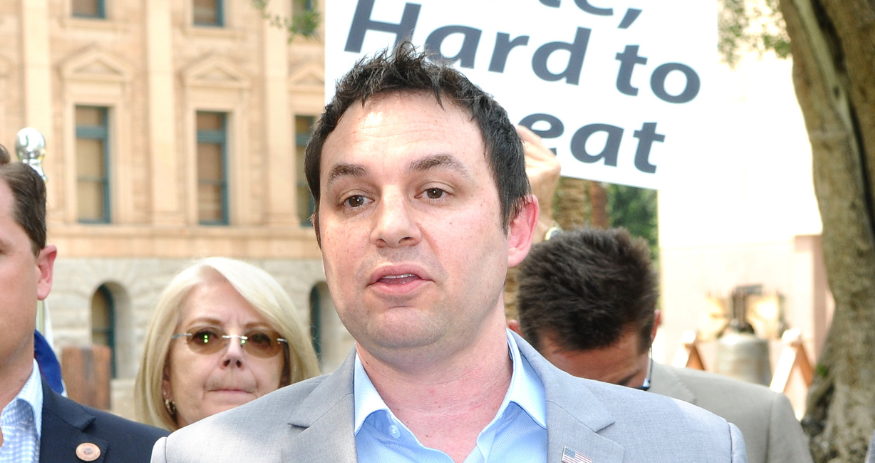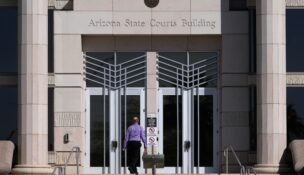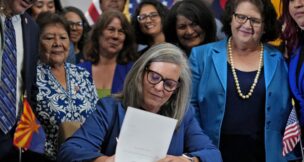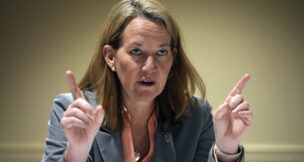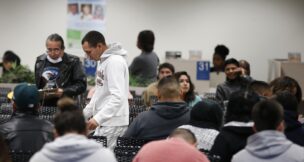Judges rule Arizona can enforce law adding steep penalties for voter registration violations
Howard Fischer, Capitol Media Services//September 20, 2024//
Judges rule Arizona can enforce law adding steep penalties for voter registration violations
Howard Fischer, Capitol Media Services//September 20, 2024//
PHOENIX – Arizona can now enforce a 2022 law despite claims by some that it could inadvertently make felons out of volunteers who register people to vote.
In a new opinion Friday, the 9th Circuit Court of Appeals overturned the injunction issued by a federal judge in Phoenix who had said SB 1260 is so poorly written that anyone reading it would not know what is – and is not – legal. And that, said Judge Murray Snow, made it unconstitutionally too vague to be on the books.
Snow also barred the state from implementing another part of the same law detailing when county election officials are required to cancel a voter’s registration. The judge said it runs afoul of the National Voter Registration Act which requires that the person be notified before being taken off voter rolls.
But appellate Judge Kenneth Lee, writing for the majority in a 2-1 ruling, said there’s a major flaw in the lawsuit, and in Snow’s ruling. He said the three nonprofit groups who filed the lawsuit lack legal standing because they failed to show how the provisions on voter registration harmed their “core activities.”
Lee acknowledged they had legal standing to challenge that separate provision that makes it a felony to provide a “mechanism for voting” to someone registered in another state.
But he said that the wording of the statute made it clear that the only thing the 2022 law would outlaw are unlawful acts of voting. Lee said nothing in the law would make felons out of individuals and organizations for normal voter outreach or registration activities.
SB 1260, sponsored by Sen. J.D. Mesnard, R-Chandler, was one of dozens of measures proposed by GOP lawmakers in 2022 amid claims that changes were needed to prevent fraud.
It includes language making it a Class 5 felony for anyone who “knowingly provides a mechanism for voting to another person who is registered in another state.” That carries a presumptive 18-month prison term.
He said the target is anyone who would forward an early ballot addressed to someone not living in Arizona.
Mesnard acknowledged he has no first-hand knowledge of people getting early ballots from Arizona who are registered elsewhere. Instead, he said, “folks (have) come to me and insist this has happened,”
“I’ve had folks come to me and insist this has happened,” he said.
“I’ve not gone to investigate,” he continued. But Mesnard said that his legislation will “make it clear” what the law requires.
In enjoining enforcement, Snow ruled that the bill does not define what is a “mechanism.”
“Thus, in the context of SB 1260, the ordinary meaning of ‘mechanism for voting’ could include any necessary items involved in the process of voting,” the judge wrote in his 2022 order. And that, he said, is where it creates legal problems for the Arizona Alliance for Retired Americans, Voto Latino, and Priorities U.S.A., the groups that challenged the law that sign people up to vote.
For example, Snow said, a voter registration form is a “mechanism for voting” as registration is a prerequisite to being able to cast a ballot.
“It is entirely possible that plaintiffs, in registering newly arrived residents, may be charged with knowledge that those new residents didn’t cancel their previous voter registrations,” Snow wrote.
Lee rejected that contention.
“Construed under its ordinary meaning, the phrase ‘mechanism for voting’ likely refers to a process, technique, or instrument for casting a vote,” the appellate judge wrote. That plain-meaning construction of the phrase does not include activities such as voter registration because providing a mechanism for registering to vote is different than providing a ‘mechanism for voting.”
The other provision that Snow blocked deals with those already registered to vote in Arizona.
It says if a county recorder receives “credible information” that someone is registered in another county and confirms that fact, the recorder must cancel that person’s registration.
Attorney Daniel Arellano who represents the groups who challenged the law argued that creates a situation where someone who has moved could lose his or her registration in both the old and new counties. What’s worse, he said, the person doesn’t even know.
Snow said the legal issue is even more basic than that.
He said the National Voter Registration Act spells out the ways a state can cancel someone’s registration.
One is if the person directly requests to be removed from the rolls.
States can also cancel a registration if the person has confirmed in writing he or she has moved out of the registration area. And cancellation is allowed only after providing notice followed by a specified waiting period.
Lee, in writing for the appellate court, did not address those specific contentions. Instead, he said, the challengers simply lack standing to sue.
He said their basis for seeking the injunction was that the provision could force them to divert resources because voters’ current registrations, versus old, outdated registrations, might be canceled. That, the challengers argued “interferes with their mission to encourage minority voter registration.”
Lee called that a “conjecture-laden theory.”
More to the point, Lee said nothing in the law affects the activities they already were doing.
“The plaintiffs can still register and educate voters – in other words, continue their core activities they have always engaged in,” the appellate judge wrote.
Anyway, Lee said, the law is nowhere near as broad as challengers say. He said it simply says that a county recorder will cancel a registration when the recorder “receives confirmation from another county recorder that the person registered has registered to vote in that other county.”

